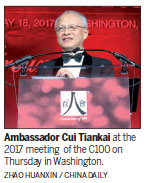Cui: Belt, Road on peaceful path
The Belt and Road Initiative is more than just building roads and railways, it is about building connectivity that leads to peace, prosperity, openness and development for all, Chinese Ambassador to the US Cui Tiankai said on Thursday.
While receiving a Leadership Award for Advancing US-China Relations at the opening gala of the 2017 annual conference of the Committee of 100 (C100), Cui also said that President Xi Jinping and US President Donald Trump are going to meet later this year.
Iowa Governor Terry Branstad, Trump's pick for US ambassador to China also received the award. His son received the award on his behalf.
C100 is an organization of Chinese Americans dedicated to the spirit of excellence and achievement in America. Its members include architect I.M. Pei and cellist Yo-Yo Ma.
"We are encouraged by the positive response from the international community to the success of the Belt and Road Forum," Cui said of the meeting that concluded on Monday in Beijing.
"China is ready to work with all parties, including the United States, to translate these grand ideas into reality."
The US has formed the American Belt and Road Working Group to serve as "one node" for cooperation on the initiative, according to Matthew Pottinger, special assistant to Trump, who led the US delegation to the forum.
Borrowing the philosophy of the traditional Chinese medicine, Cui said that when a person is not feeling well, the root cause is that his qi gets disrupted, because qi is essential in keeping body parts connected and working in harmony.
"So, when our world is not feeling well, something important that supposedly is to flow smoothly is missing," Cui said. "To our world today, the missing qi is connectivity, both in physical and in the subjective sense."
BRI offers the right spirit and tools that connect countries and peoples, said Cui.
He added that it aims to realize physical connectivity in land, sea, air and cyberspace; soft connectivity in policies, rules and standards, and enables the unimpeded flow of capital, technology, information, products, industries and personnel.
The ambassador also said he believed the Xi-Trump meeting in early April was also about fostering better connectivity between China and the US.
He said cooperation is the only right choice for the two largest economies in the world.
"The problems in today's China-US relationship should not be seen as permanent and insurmountable ones," Cui said.
"The way to fix them is to further develop our relations and resolve problems in a sensible and proper manner through coordination and consultation."
Congressman Ed Royce, chairman of the House Foreign Affairs Committee, said that prosperity and opportunity across the globe depend on the success of Sino-US relations.
"The way to peace and understanding is through engagement, through understanding culture, and through understanding the bridge that the Chinese-American community is creating," he said.
Congresswoman Judy Chu, chair of the Congressional Asian Pacific American Caucus, said: "When it comes to aggregating Chinese Americans' voices in the US-China relationship, there's no better outlet than C100."
Yuan Yuan in Washington contributed to this story.
huanxinzhao@chinadailyusa.com



















